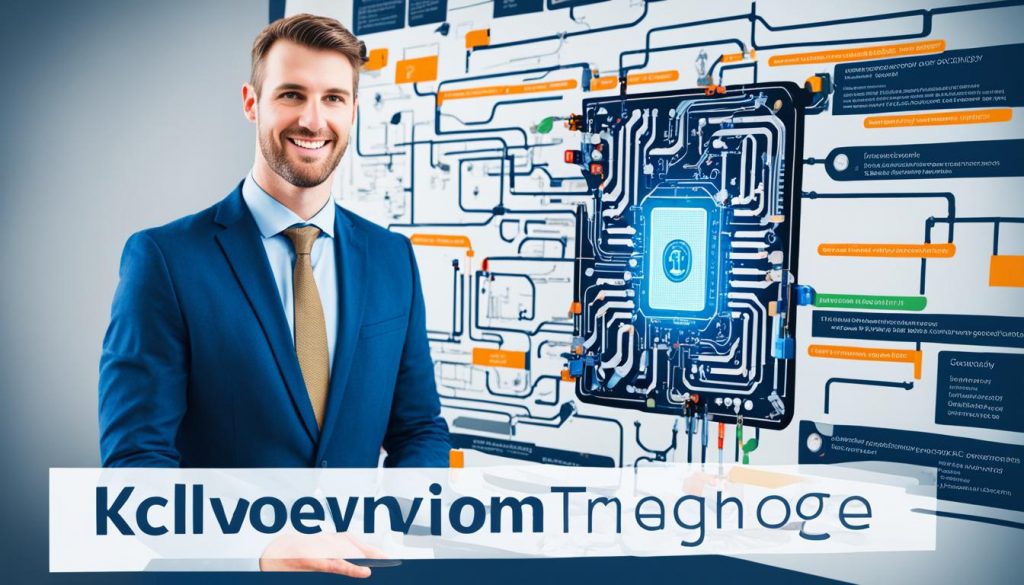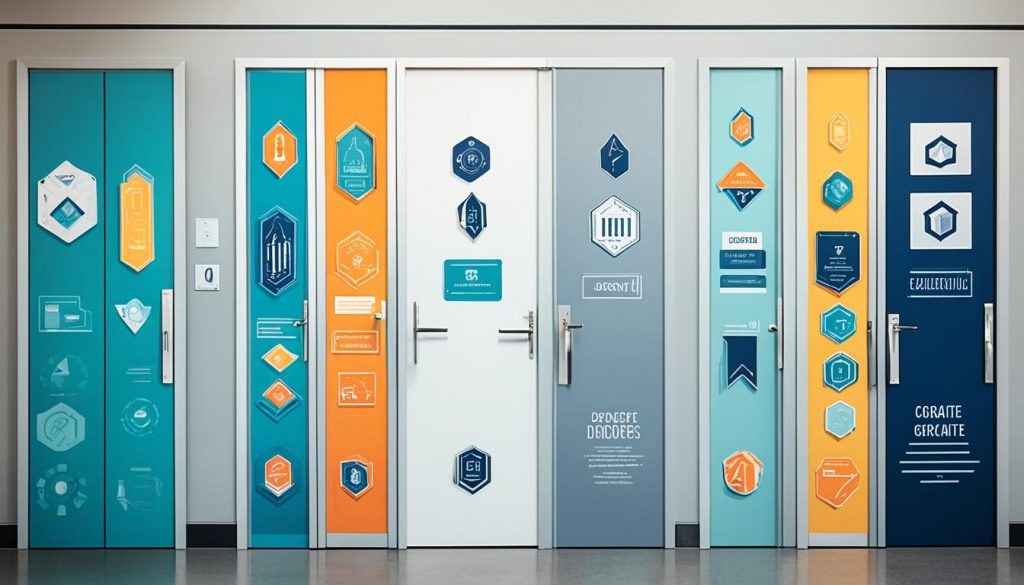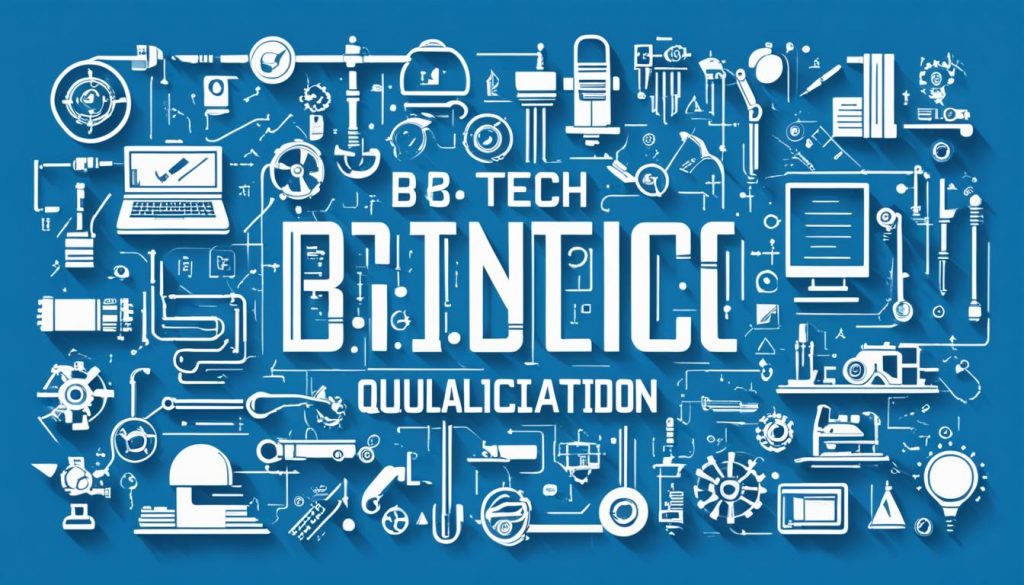b tech comes under which degree The Bachelor of Technology, commonly shortened to B Tech, is a pivotal undergraduate degree. It’s deeply rooted in engineering and technology disciplines. This degree demands a rigorous four-year course, equipping students with a broad spectrum of technical skills and knowledge. It’s essential to grasp the B Tech’s position within the academic landscape for those eyeing advanced education in this field.
My investigation into the B Tech degree classification aims to shed light on its role within the educational structure. It’s vital to understand its importance and the career prospects it opens up for graduates. As we proceed, I will contrast it with other engineering degrees, such as the Bachelor of Engineering. This will shed light on the distinct qualities that differentiate them. By the conclusion, you’ll possess a nuanced comprehension of the B Tech program and its advantages in the employment sphere.
Table of Contents
Key Takeaways
- B Tech is a focused undergraduate degree in engineering and technology.
- The program typically spans four years and includes industrial visits and internships.
- B Tech graduates are often equipped with practical skills essential for the workforce.
- This degree is crucial for understanding the dynamics of engineering education.
- Comparing B Tech with other engineering degrees like B.E reveals unique curricular differences.
- Career opportunities are plentiful for B Tech graduates in diverse sectors.
Understanding the B Tech Degree
The B Tech degree is a pivotal academic achievement for those aiming to thrive in engineering and technology fields. It combines practical skills with theoretical knowledge, preparing students for the modern industry’s complexities. The program focuses on innovation and real-world applications, fostering specialized expertise in fields like Computer Science, Aeronautical Engineering, and Biotechnology.
To pursue a B Tech, students must secure at least 50% in Physics and Chemistry at high school. The program extends over four years, with eight semesters of intense coursework. Students delve into critical subjects such as Fluid Mechanics, Thermodynamics, and Digital Electronics, gaining a deep grasp of engineering principles.
Comparing it to the Bachelor of Engineering (B.E.) degree reveals distinct differences. B.E. focuses more on theory, covering subjects like Engineering Physics and Mechanical Engineering. The teaching methods also diverge, with B Tech emphasizing skill-based training to adapt to technological changes, whereas B.E. adopts a knowledge-focused approach.
B Tech graduates are well-suited for roles such as Electrical Engineer, Software Developer, and Robotics Engineer. Leading companies like Tata Consultancy Services, Infosys Technologies, and Google seek out B Tech graduates for their practical skills and ability to address engineering challenges.
This comprehensive insight into the B Tech degree is invaluable for both prospective students and professionals. It helps navigate educational and career choices effectively.
What is a Bachelor of Technology?
A Bachelor of Technology (B Tech) is a specialized undergraduate degree focused on engineering and technology. It equips students with crucial technical skills for various sectors in the industry. It’s vital for both prospective students and employers to grasp the degree’s classification.
Definition and Overview
The Bachelor of Technology offers a comprehensive program in engineering fields. It includes vital subjects like mathematics, physics, and specialized engineering disciplines. This ensures students are ready to tackle career challenges. Many technical institutes provide this degree, offering a deep understanding of technology’s theoretical and practical sides.
Duration and Curriculum
The program typically lasts four years, divided into eight semesters. The curriculum blends core subjects with practical projects, lab work, and internships. These experiences are crucial for understanding technology’s real-world applications. For the b tech degree classification, this focus on practical application is key.
Curriculum updates keep students abreast of technological advancements in their fields. This ensures they’re well-prepared for the industry’s evolving demands.

B Tech Comes Under Which Degree?
The B Tech degree is classified as a bachelor’s degree, focusing on engineering and technology. It is often seen as equivalent to the Bachelor of Engineering (B Eng.) degree. This highlights the crucial role of the bachelor of technology in developing skilled professionals across various technical fields.
Georgia Tech, among other institutions, offers Bachelor of Science degrees in numerous areas, blending technology and engineering. The College of Engineering at Virginia Tech showcases the extensive options available to students of the bachelor of technology. These specialized engineering paths prepare graduates for high-demand sectors, enhancing their job readiness.
These programs adhere to strict accreditation standards, such as those from the Engineering Accreditation Commission of ABET. This ensures that students pursuing a B Tech or similar degree receive a solid education. It is based on mathematics, natural sciences, and engineering design principles.

For aspiring students, it is crucial to understand the academic classification of the B Tech degree. This not only underscores the educational commitment but also confirms the professional opportunities linked to a bachelor of technology degree.
Academic Classification of B Tech
The B Tech degree plays a vital role in higher education. It is classified as an undergraduate degree, similar to traditional bachelor-level qualifications. Institutions like the IITs and NITs offer B Tech programs, known worldwide for their thoroughness and challenge.
B E and B Tech programs both last four years, divided into eight semesters. This structure provides a deep grasp of engineering through a balanced curriculum. The All India Council for Technical Education (AICTE) sees B E and B Tech as equals, giving them the same academic standing.
The B Tech curriculum is regularly updated to include the newest in technology and engineering. Students benefit from internships and industrial visits, connecting their studies to real-world scenarios. While B E programs may suggest internships, they’re not required.
Both B Tech and B E graduates are highly regarded in the job market, offering wide career opportunities. The initial career path is influenced by the college’s quality, faculty, and industry ties. Thus, understanding the b tech degree classification and its academic position is key for students aiming for a successful engineering career.

Comparison with Other Engineering Degrees
Choosing an engineering education path involves weighing various degree options. This section highlights the differences between a Bachelor of Engineering (B Eng.) and a Bachelor of Technology (B Tech). It also explores technology bachelor’s programs in the U.S.
Bachelor of Engineering vs B Tech
The Bachelor of Engineering and Bachelor of Technology are both respected in the engineering education landscape. They both last four years but focus on different aspects. A B Eng. focuses on theoretical engineering principles, preparing students for deeper engineering knowledge. On the other hand, a B Tech emphasizes practical skills and application, tailored for industry needs.
Both degrees have similar course fees, ranging from INR 50,000 to 14 Lakh. Yet, their outcomes vary. B Eng. graduates often become Design Engineers or Quality Control Engineers. B Tech graduates might work as Software Developers or Application Analysts. Both paths offer strong job prospects in both public and private sectors, providing diverse career paths.
Technology Bachelor’s Programs in the U.S.
In the U.S., technology bachelor’s programs offer a variety of specialized degrees. For instance, New York City College of Technology provides B Tech courses that meet the job market’s demands. These programs include a broad curriculum, preparing students for roles in fields like Computer Engineering, Civil Engineering, and Data Analysis. With over 40 specializations, students can tailor their education to their career goals.
| Degree Type | Focus | Course Fees (INR) | Career Roles |
|---|---|---|---|
| Bachelor of Engineering | Theoretical Foundations | 50,000 – 14 Lakh | Design Engineer, Quality Control Engineer |
| Bachelor of Technology | Practical Applications | 50,000 – 14 Lakh | Application Analyst, Software Developer |

Eligibility Criteria for B Tech Programs
To grasp the essence of the b tech qualification, one must delve into the eligibility criteria for B Tech programs. Prospective students are mandated to finish their 12th grade with a minimum of 60% in subjects like Physics and Chemistry. For those opting for lateral entry, a diploma in an engineering field with a score of 60% is typically required. Furthermore, candidates must be between 17 and 23 years old.
- Eligibility for B Tech degree: Completion of 12th grade with at least 60% marks in Physics and Chemistry.
- For B Tech lateral entry, a minimum score of 55% in a relevant diploma is generally required.
- Entrance examinations such as JEE Main, BITSAT, and VITEEE may have additional qualifying marks associated with them.
- Regional tests like MHT CET and WBJEE require specific domicile proof.
For those aiming to pursue B Tech abroad, the eligibility criteria are stringent. They must demonstrate proficiency in language tests and provide essential documents, including a Statement of Purpose and reference letters. The competition for B Tech programs is fierce, underscoring the need for not just academic excellence but also a deep dedication to engineering.

Career Opportunities with a B Tech Degree
Graduates with a B Tech degree unlock a broad spectrum of career paths across diverse sectors. Their comprehensive training equips them for roles in IT, manufacturing, telecommunications, and construction. This specialized knowledge and extensive training prepare them for the workforce.

The technical skills acquired in a B Tech program empower graduates to stand out in a competitive job landscape. Their focus on practical applications boosts their abilities, making them highly sought after by employers.
| Specialization | Typical Roles | Average Starting Salary (India) |
|---|---|---|
| Computer Science | Software Developer | Rs 20,000 – Rs 30,000 |
| Civil Engineering | Civil Engineer | Rs 20,000 – Rs 30,000 |
| Mechanical Engineering | Mechanical Engineer | Rs 20,000 – Rs 30,000 |
| Aerospace Engineering | Aerospace Engineer | Rs 20,000 – Rs 30,000 |
Beyond job roles, a B Tech degree also paves the way for advanced education. Many graduates opt for M.Tech, MBA, or Ph.D. programs. Entrepreneurship becomes a viable option for those eager to innovate and start their own ventures.
The solid foundation laid by a B Tech degree opens doors to a multitude of career opportunities. These opportunities offer substantial growth potential within both the domestic and international job markets.
Institutions Offering B Tech Degrees
Several reputable institutions in the United States provide robust B Tech degree programs. Choosing the right institution is crucial for a student’s education and career in engineering. It helps prospective students make informed decisions by understanding the characteristics of notable universities.
Notable universities in the United States
Many institutions offering B Tech degrees focus on practical skill development. This ensures graduates are well-prepared for the workforce. The following table showcases some prominent universities, their locations, and specific B Tech programs they offer:
| University Name | Location | B Tech Programs Offered |
|---|---|---|
| Texas A&M University | College Station, TX | Electrical Engineering, Mechanical Engineering, Civil Engineering |
| New York City College of Technology | Brooklyn, NY | Computer Engineering Technology, Electrical Engineering Technology |
| Georgia Institute of Technology | Atlanta, GA | Biomedical Engineering, Environmental Engineering |
| Purdue University | West Lafayette, IN | Aerospace Engineering, Computer Science |
| University of California, Berkeley | Berkeley, CA | Industrial Engineering and Operations Research, Mechanical Engineering |
These institutions are renowned for their dedication to combining theoretical knowledge with hands-on experience. They offer a range of programs tailored to the industry’s evolving needs. This prepares students for various roles within engineering and technology sectors.

B Tech Degree Classification
The B Tech degree classification is a crucial undergraduate engineering degree recognized worldwide. It ensures uniformity in education, benefiting both students and employers. This uniformity guarantees that the skills and knowledge acquired match the workforce’s evolving demands.
A typical B Tech program spans four years, offering a detailed curriculum. It emphasizes practical applications and theoretical foundations. In contrast, a traditional B.Sc. degree usually takes three years, covering less subject matter but in greater depth.
Here is a comparison to highlight the distinctions:
| Aspect | B Tech Degree | B Sc Degree |
|---|---|---|
| Duration | 4 Years | 3 Years |
| Career Focus | Technical and Applied Engineering | Theoretical and Laboratory Work |
| Common Careers | Software Developer, Web Developer, Mechanical Engineer | Laboratory Assistant, Researcher, Educator |
| Average Salary (LPA) | 4.6 – 5 | 4.5 |
| Complexity | Higher Due to Extended Studies | Moderate |
With this B tech degree classification, graduates gain diverse opportunities in engineering and technology. They are empowered to excel in a competitive job market. The focus on practical experiences prepares B Tech graduates to address real-world challenges effectively.

Degree Options for B Tech Graduates
Graduates with a B Tech degree enjoy a plethora of degree options for B Tech that boost their knowledge and career prospects. Many opt for a Master’s degree in engineering or technology, like an M.Tech or M.S. These advanced degrees enable specialization in cutting-edge fields, including artificial intelligence and cybersecurity. With a B Tech focus, I’ve observed my peers moving into roles requiring deeper knowledge.
B Tech programs typically last four years, whereas diploma programs are shorter, lasting two to three years. This disparity impacts the depth of study and potential salary. B Tech graduates usually earn more, reflecting their comprehensive training and expertise. They gain access to a broader spectrum of job opportunities across sectors like engineering, IT, and R&D.
| Degree Type | Duration | Salary Range | Job Opportunities |
|---|---|---|---|
| B Tech | 4 years | Higher earnings | Software engineering, aerospace engineering, data analysis |
| B Tech Diploma | 2-3 years | Lower earnings | Entry-level positions in various sectors |
B Tech students often find opportunities in specialized areas like computer network architecture and cybersecurity analysis. This leads to job prospects with high technical demands. Both B.Tech and B.E programs share core subjects but differ in job placement advantages based on specialization. B Tech graduates, with their practical skills and current knowledge, can easily move into industry roles or pursue further academic studies.

What is the B Tech Qualification?
A B Tech qualification shows that one has finished an approved program in engineering or technology. This degree proves a solid base in theoretical knowledge and practical skills needed for real-world engineering problems. It requires assessments like projects, exams, and internships that enhance learning.
The B Tech is an undergraduate course mainly focused on technology’s hardware side. It deeply engages students with applied engineering, preparing them for diverse roles in the workforce. To qualify, students need to have completed 10+2 with subjects like physics, chemistry, and mathematics, scoring at least 50%.
The B Tech program spans four years, split into eight semesters. Students explore various specializations, including Computer Science, Aeronautical Engineering, and Biotechnology. These specializations are designed to meet the industry’s changing needs, preparing graduates for their careers.

Below is a table that highlights the differences between B Tech and other engineering degrees:
| Criterion | B Tech | B E |
|---|---|---|
| Full Form | Bachelor in Technology | Bachelor in Engineering |
| Focus Areas | Practical application, Hardware | Theoretical aspects, Science |
| Duration | 4 years (8 semesters) | 4 years (8 semesters) |
| Eligibility Criteria | 10+2 with Physics and Chemistry, Minimum 50% | 10+2 with Physics and Chemistry, Minimum 50% |
| Specializations | Computer Science, Biotechnology, etc. | Civil Engineering, Environmental Engineering, etc. |
| Graduation Recognition | Recognized Engineering Degree | Recognized Engineering Degree |
| Job Roles | Electrical Engineer, Software Developer | Civil Engineer, Electronics Engineer |
The B Tech qualification opens doors to many career paths, combining scientific theory with practical skills. This path prepares students for a competitive job market, aligning with industry demands.
B Tech and Its Academic Classification
B Tech is a key part of bachelor-level degrees, often mentioned alongside traditional engineering programs. It’s crucial to grasp this classification to fully understand higher education’s structure. Many tech professionals see B Tech as a cornerstone for their career paths.
Worldwide, education systems have crafted their own degree frameworks. The UK distinguishes between first, second (upper and lower), and third class honours for its degrees. Canada, on the other hand, offers the Bachelor of Engineering (B.Eng.), Baccalauréat en génie (B.Ing.), and Bachelor of Applied Science (B.A.Sc.) for engineering. Australia has the Bachelor of Engineering (BE) as a vital undergraduate degree.
These classifications reflect a degree’s prestige and difficulty, and B Tech’s classification fits right in. The B Tech program usually takes four years, covering engineering areas like Computer Science, Mechanical, and Chemical Engineering.

Most B Tech graduates start working right away, thanks to the program’s focus on practical skills. This prepares them for the challenges of their fields. Schools like the Manipal Institute of Technology highlight the B Tech degree’s strengths through detailed training and partnerships with the industry. This underlines its importance in the academic world.
Importance of B Tech in Today’s Job Market
In today’s competitive job market, the b tech degree in focus serves as a gateway to success in technology-driven sectors. Companies worldwide rely heavily on advanced technology, making the importance of b tech paramount in creating a skilled workforce.
Graduates with a B.Tech degree are highly sought after across various industries for their technical prowess. For example, those with a specialization in computer science can expect competitive salaries, highlighting the financial advantages of this degree. It’s essential to select a specialization within B.Tech wisely, as job opportunities and salary trends vary significantly by field.
Attending a prestigious institution significantly boosts career prospects. Skills developed during B.Tech programs, such as communication, teamwork, and project management, are crucial for success in any professional environment. While the potential for financial stability is substantial, salaries can fluctuate based on specialization, experience, and location.
To stand out in the job market, it’s vital to participate in internships, personal projects, and continuous skill enhancement. These activities not only highlight one’s abilities but also show a dedication to ongoing learning and professional development. The true worth of a B.Tech degree lies in aligning with individual career goals, a passion for technology, and a commitment to advancing engineering fields.

Conclusion
The question of what degree a B Tech falls under is crucial for students planning their academic paths. This degree, classified as a bachelor’s in engineering and technology, spans four years. It equips students with both theoretical knowledge and practical skills. This prepares them for the dynamic job market.
Upon graduation, B Tech holders are poised for immediate employment in top companies like Google, Microsoft, and Amazon. It also opens doors to further education, such as an M.Tech. This versatility makes the B Tech degree highly valuable across sectors from civil engineering to artificial intelligence.
A B Tech degree transcends mere academic achievement; it’s a portal to varied career paths and advanced studies. Grasping the classification of a B Tech degree is key to making informed decisions about my education and future career.
